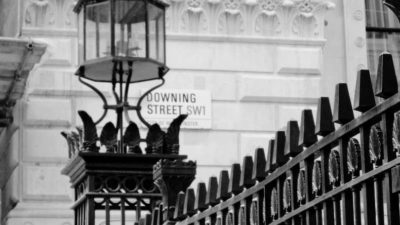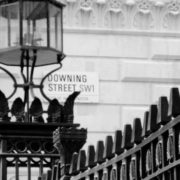Gone are the days when Rishi Sunak was prepared to open the government coffers up to see the UK through a crisis.
The pandemic spending spree is well and truly over and the former Chancellor will take the top job in the guise of a strict and austere headteacher.
He will be determined not to see the bond market run amok again, threatening the country’s financial stability.
He will be revelling in the fact that his curriculum of higher taxes and curtailed spending, which he preached on the campaign trail, is already being followed.
However, it’s likely he will take an even harder line now on government budgets, given the punishment threatened to be handed out again comes in the form of much higher government borrowing costs.
He will also want to show he is co-operating with the Bank of England by being ultra conservative fiscally in a bid to tame high inflation.
Ties of loyalty to Boris Johnson still run deep though, and Rishi Sunak will find it hard to shake the traitor tag attached at the time of Johnson’s downfall.
Garnering support across a divided party for highly unpopular spending cuts will be a hard task.
He is likely to stay highly reliant on the hard Brexit wing of the party for support, which is likely to mean that hopes of a softening approach in talk with the EU on trade are likely to be wishful thinking.
Rishi Sunak is set to stay a Brexiteer through and through and is also expected to continue to take a hard line on immigration, despite the struggles of businesses grappling with intense labour shortages.
However, there may well be more progress with an Indian free trade agreement, which was put on ice, following a row over student visas.
It’s likely he will push hard for a breakthrough, given the dearth of any positive news on the trade front for the UK.
He is also set to style himself as a tech evangelist Prime Minister, given this record in funding tech start-ups while at the Treasury.
With his experience as a hedge fund manager and the time he’s spent in California, right in the heart of the big tech industry, he will be expected to give a rocket boost to home grown tech talent.
This will be no quick fix though, and new tech listings are likely to still be few and far between in the UK given the risk premium still attached to UK assets.
Sarah Coles, senior personal finance analyst at Hargreaves Lansdown, comments:
“This isn’t the same Rishi Sunak who gave Santa a run for his money during the pandemic.
He’s going to have an incredibly tight hold on the purse strings.
Jeremy Hunt is likely to stay at Number 11 with his mantra of tough decisions and spending cuts.
It means we may not be able to rely on extra help when we’re facing horrific price rises next April.
It was partly Sunak’s commitment to keeping a lid on spending, and higher levels of taxation that persuaded Conservative Party members that there had to be an easier answer during the last leadership election.
The short and messy premiership of Liz Truss may well have cemented the opinion that right now there’s no alternative.
Anyone who relies on benefits to make ends meet will be crossing everything that Sunak’s previous commitment to uprate benefits with inflation in April will stand the test of time.
However, given that his Chancellor has thrown the uprating into doubt, there are no guarantees at this stage.
Those on the lowest incomes have been hit hardest by rocketing prices, so have been left with impossible challenges.
If benefits don’t keep pace with inflation in April, this will make life even more impossible.
On the other side of the balance, Sunak will be dealing with a divided party, nervous about re-election.
It’s going to make it more difficult for him to pass legislation which is going to leave so many voters so much worse off.
Sunak’s previous approach to energy support was the lump sums we’re receiving now.
He opted for universal help, but at a far lower level than Truss subsequently introduced.
Hunt has pledged more targeted support for those on the lowest incomes from April.
This could mean more lump sums, but on a means-tested basis.
If the system is developed to offer help to those who need it, this may be enough to help us through a really difficult period.
However, if the line is drawn so that average earners are out in the cold, it could be devastating.
At the same time, news emerged over the weekend that Jeremy Hunt is planning to extend the freeze on income tax thresholds into the next parliament.
By 2027/28 this is expected to cost taxpayers £5 billion a year more, as millions of people are dragged into paying higher rate tax.
It’s an extension of an existing policy brought in by Rishi Sunak, so while it isn’t guaranteed to happen, the change of Prime Minister may not alter any plans already in place.”
Helen Morrissey, senior pensions and retirement analyst at Hargreaves Lansdown, comments:
“As we prepare to usher in a new Prime Minister the future of the pension triple lock could once again be called into question.
Liz Truss’s protestations that the triple lock would be protected were placed against a backdrop of her Chancellor, Jeremy Hunt refusing to confirm any such thing.
Truss has now gone, and if Hunt remains in place the new Prime Minister will be under pressure to confirm whether it stays or goes.
Rishi Sunak has defended the triple lock in the past saying pensioners are a vulnerable group within society and that it should be protected.
However, he was the one who took the decision to suspend it last year as the furlough scheme distorted earnings figures.
Given the current need to cut back on costs, he may feel he has little choice but to do it again.
It will be a tricky decision to take though given rampaging inflation has left many pensioners in severe financial difficulty.
Bringing calm to the gilt markets will be another priority after the mini-budget brought bond market chaos and caused defined benefit pension schemes using liability driven investment to run into difficulties.
The Bank of England’s bond buying programme helped stabilise the markets, but Governor Andrew Bailey was quick to point out this support was time limited leading to concerns within the industry that gilt yields could spike again causing further upheaval.
With the medium-term fiscal plan and the crucial OBR report looming, Sunak will be mindful not to cause another gilt market horror show.”
Ben Woolman, Director at Woolbro Group, commented:
“Rishi Sunak must now work at pace to undo the damage that Kwasi Kwarteng’s mini-Budget inflicted on the housing market.
The scale of the challenge ahead of him in tackling Britain’s housing crisis is enormous, however, things are already looking up for the new PM.
Firstly, mortgage rates fell for the first time since the start of September on Friday, though they are still uncomfortably high at 6.55% for an average two-year fixed rate deal.
And following Jeremy Hunt’s scrapping of most of the tax breaks announced in the mini-Budget, Mr Sunak’s background in finance could serve as an additional calming influence on markets.
This, subsequently, should eventually bring mortgage rates closer down to earth again.
However, the former chancellor must still exercise caution when planning his next move to tackle Britain’s housing crisis.
While his pledges to scrap the Government’s 300,000 homes-a-year target and block greenbelt development would have resonated with Tory voters during his leadership bid this summer, they would have done little to help struggling first-time buyers in reality.
Mr Sunak should therefore be mindful that 2024’s general election will come around quickly – and many voters still struggling to get a foot onto the property ladder will be unlikely to show their support at the polls.
First and foremost, Mr Sunak must get long-overdue reforms of Britain’s planning system over the line once and for all.
It is unquestionably the greatest barrier to delivering the new homes this country needs and, therefore, tackling our housing crisis.”
Nathan Reilly, Director of Customer Relationships at Twenty7tec, comments:
“Congratulations to Rishi Sunak who the markets will welcome as a pragmatic and consistent operator and one who plotted a path through the pandemic’s choppy waters with aplomb.
Our sense is that the mortgage market would love to see Government take a more holistic view on how housing and mortgages can work closely together to bring about the UK’s continued economic success.
Housebuilding alone won’t be enough if people can’t afford the homes.
Perhaps Treasury and Levelling Up, Housing and Communities could work more closely, and importantly engage with representatives from across the market itself, to drive real change and innovation?”
Hugh Blaza, Senior Consultant at Sandstone Law, comments:
So what will be different from the Truss ‘blink and you’ve missed it’ premiership.
How could we know? Not a single speech from Sunak throughout the campaign and so we find ourselves with a new PM elected by fewer than 200 people and with no discernible mandate.
During his summer jousts with Truss, Sunak adopted the ‘triple repeat’ approach, believing (presumably) that if he said the same word more than twice, it would be remembered as if it had been carved into tablets of stone.
But does anyone still recall the ‘brownfield, brownfield, brownfield’ mantra Sunak trotted out to reassure the Conservative shires that their green belts would (despite the sacrifice of them in so many already adopted local plans, not to mention that little parcel of agricultural land he needed to accommodate his new swimming pool) be safe?
And what of charter cities where planning laws may become a distant memory? And then there’s the ‘bonfire of regulations’ which look destined for the shredder as a result of The Retained EU Law (Revocation and Reform) Bill 2022?
The trouble is, no-one, least of all the tiny handful of people who supported Truss, then Johnson, then Mordaunt, then Sunak himself knows or cares.
The best we can take from the past 4 months is that we are that much closer to a General Election when the politicians who want our votes will need to put their cards on the table.
Until then, it’s the wild west out there.”
Tom Bill, head of UK residential research at Knight Frank, said:
“Falling borrowing costs will support demand and transaction volumes in the UK housing market, but this should be seen in context.
Mortgage rates may come down compared to the period following last month’s mini-Budget but a 12-year period of ultra-low borrowing costs is over.
As demand subsides, 18 months of double-digit house price growth will also come to an end.”
Giles Sutcliffe, head of affordable housing at Cluttons, said:
“Ongoing growth in construction costs, ongoing supply chain problems, a construction industry labour shortage, elevated interest rates and high home prices continue to exacerbate housing affordability challenges.
We need to see the Government reduce inflation, allowing for stabilisation of long-term interest rates, which in turn, will provide trust and confidence for the demand-side of the housing market in the coming months.”
Grainne Gilmore, director of research and insight at Cluttons said:
“Today’s appointment of a new prime minister is a much needed step away from the political instability of the last few months.
There are still economic headwinds ahead, but a clear and sustained message on how policymakers are going to tackle these challenges should help calm the money markets and improve sentiment.
This could have a material knock-on impact on the pricing of loans as a reduction in political upheaval allows gilt rates to fall and interest rate expectations to be revised down.
The next hurdle is the Budget next Monday, but if there are no major surprises, there will then be an opportunity for politicians to get back to business as usual, something which the markets and businesses will welcome.”
Grainne Gilmore also comments on Residential:
“More political certainty should mean that money market rates, which determine the pricing of fixed-rate mortgages, begin to recede, which could bring down the cost of fixed-rate deals.
However, it is very likely that the Bank of England will increase the base rate next month, which will result in higher payments for those on variable rate home loans.
Once the government is stabilised, they should prioritise at providing clarity around housing policies, including planning reforms, to provide a clear steer for homeowners and businesses across the industry.”






















Comments